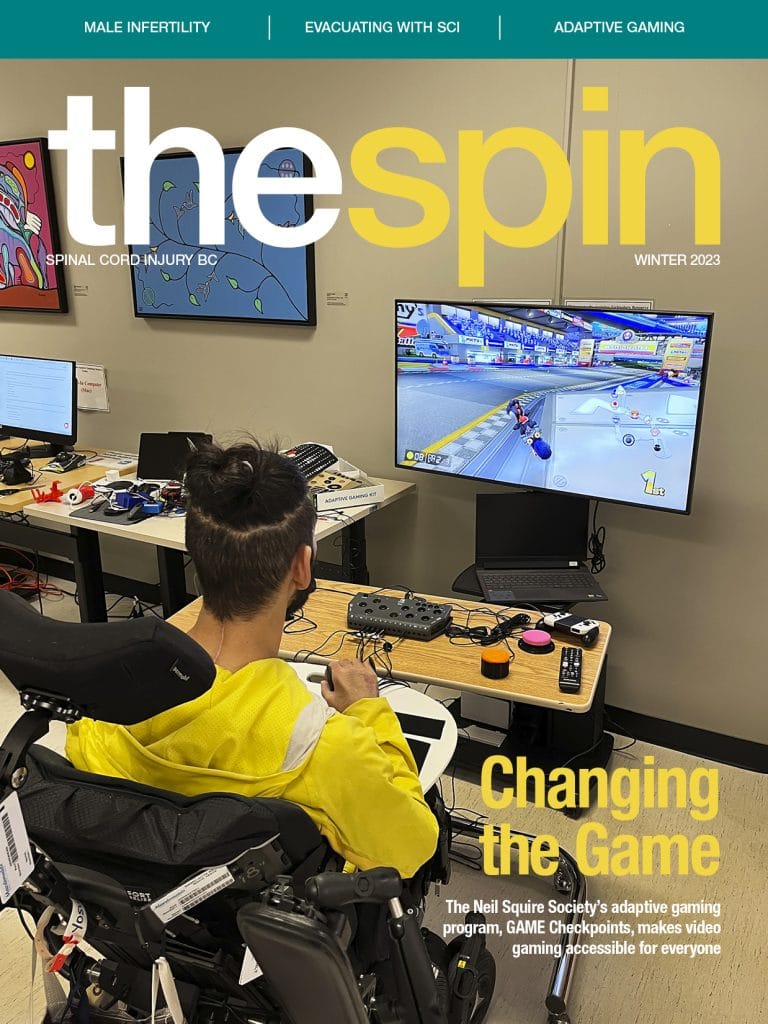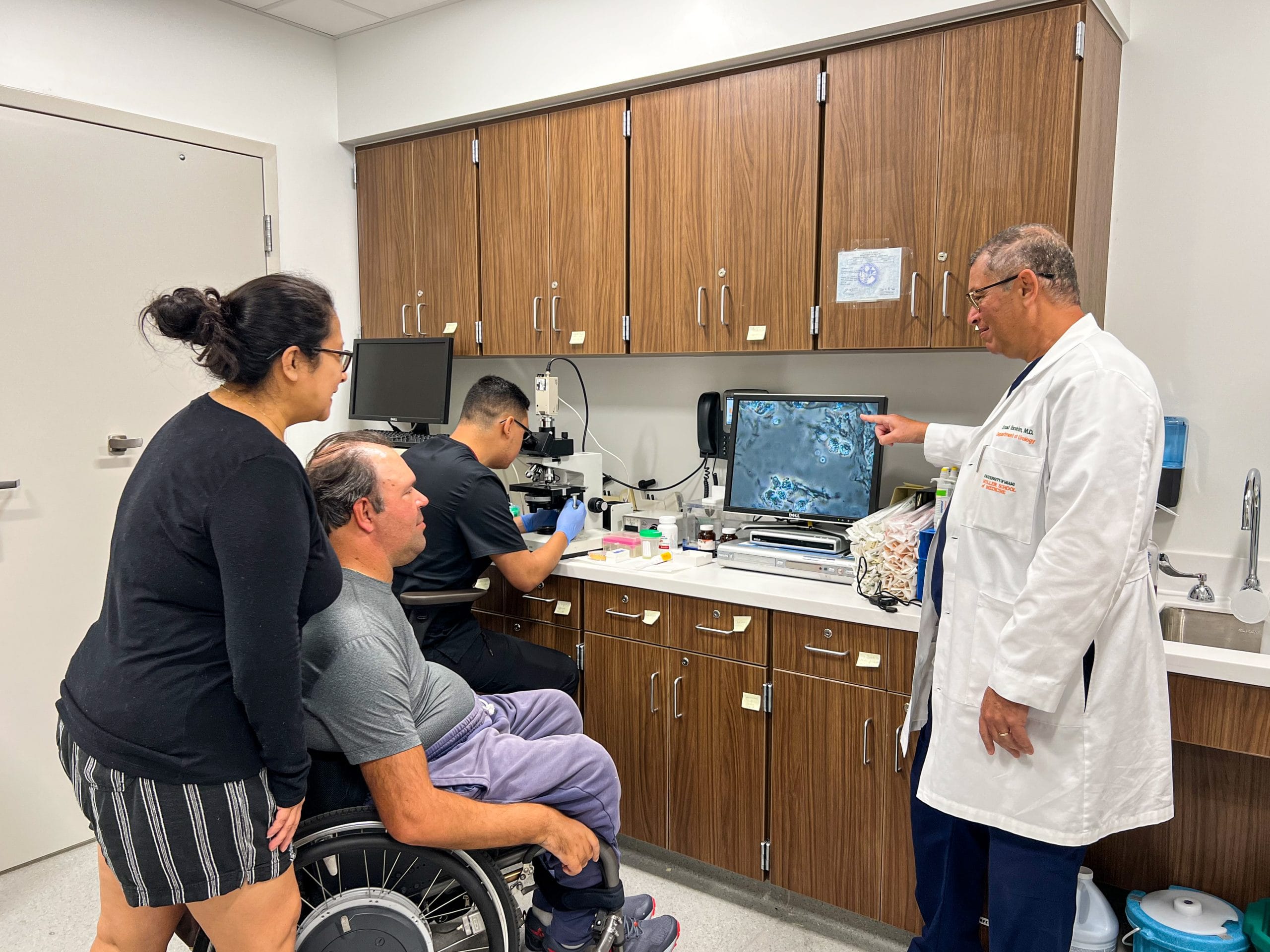
The cold, grey months of Canadian winter aren’t typically a time of year when birds and bees are active in the garden. But it is the time of year when “the birds and the bees” become more active in Canadian homes (yes, we’re talking about sex and reproduction). It’s during those cold, grey winter months that most babies born in Canada are conceived.
The question of whether or not to start a family one day likely isn’t top of mind in those first few months, or even years, after sustaining an SCI. But that doesn’t mean it won’t be a priority one day. For example, in our Fall 2016 issue, we answered a reader named Bob in “Ask the Spin Doctor.” He wrote, “Back in rehab, I never gave much thought to the idea of being a father… it just didn’t seem like it was in the cards, and so I didn’t really absorb much information about the subject when it was presented to me. Well, things have changed—and now I need to figure out what my options are. Can you help?”
Since then, we’ve covered how sexual rehabilitation and neurostimulation can improve sexual pleasure and function. But we haven’t had any notable advancements in fertility research to share with you—until now.
Dr. Emad Ibrahim, Director of the Male Fertility Research Program at The Miami Project to Cure Paralysis and an Assistant Professor of Clinical Urology and Neurological Surgery at the University of Miami’s Miller School of Medicine, has been awarded $3.25 million US dollars (approximately $4.47 million Canadian) by the US Department of Defense for a clinical trial examining the use of Probenecid—an inexpensive oral medication—to treat an infertility issue that affects most men with SCI. If successful, it would be the first ever trial to show that an oral medication can be used to improve sperm quality.
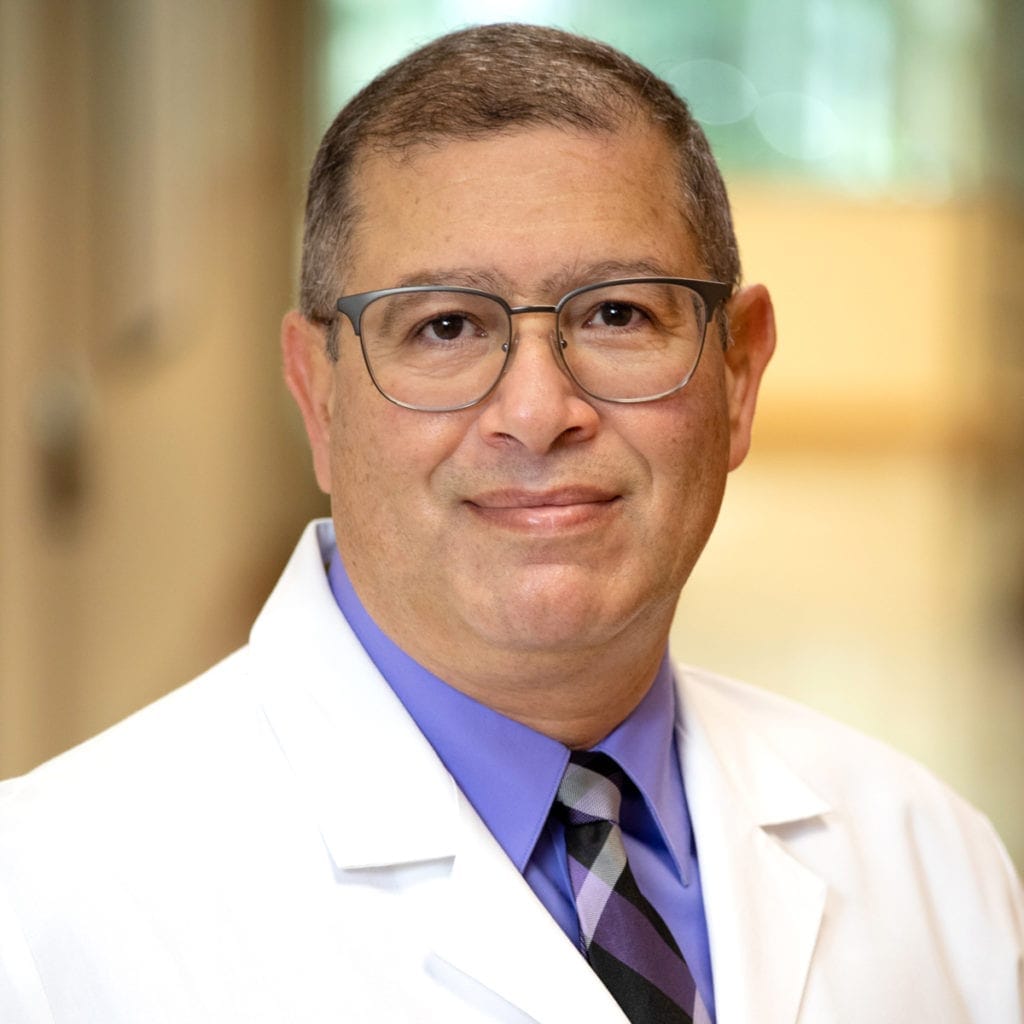
There are three issues that most men with SCI face if they would like to have a biological child. The first is erectile dysfunction, or the inability to get and keep an erection. The second, affecting at least nine in 10 men with SCI, is the inability to ejaculate. The third issue— and the focus of the trial—is poor sperm quality. According to Ibrahim, when compared to healthy, fertile men without an SCI, men with SCI typically have a similar number of sperm, but the sperm are less motile (meaning that the sperm do not move or “swim” well) and less viable (meaning that fewer sperm are alive).
“The issue comes with motility and viability— they are drastically low. So, if we say that the ‘normal’ motility is 40 percent, men with SCI would sometimes have 1-3 percent, maybe 10 percent tops. Viability tends to be higher, because the sperm can be alive even if it’s not moving, but the percentage is still low,” explains Ibrahim. “This is a very unique issue in male fertility, because most men with fertility problems in the able-bodied population would have low sperm counts with low motility. But normal counts and low motility? It’s very, very unique and it’s not very common with any other male fertility factors.”
To produce a pregnancy, a partner contributes sperm in the form of semen, and there needs to be enough “good swimmers” in the semen to reach and fertilize a partner’s egg during a period of ovulation. The male partner’s contribution of semen is generally achieved through ejaculation. For the more than 90 percent of men with SCI that cannot ejaculate on their own, there are several sperm retrieval options, including penile vibratory stimulation, electroejaculation, and surgical sperm retrieval.
“Penile vibratory stimulation, which is the gold standard and the treatment of choice, is less invasive, inexpensive, and relatively safe if we manage autonomic dysreflexia. We can train the patient and make sure that it’s safe for them to do on their own at home,” explains Ibrahim. “If we can’t get a sample by penile vibratory stimulation, then we resort to electroejaculation, which is a little bit more invasive, required to be done by a trained physician [at a clinic], and the cost of equipment is a lot higher.”
Electroejaculation is commonly needed for men with SCI below T10. If ejaculation cannot be achieved through either penile vibratory stimulation or electroejaculation, then sperm can be retrieved surgically as a final resort.
“So, let’s say we manage erectile dysfunction, and we manage the ejaculation. Now we have an ejaculate. We’re talking about the third obstacle, which is the sperm quality, and that’s where the grant comes into the picture,” says Ibrahim.
Sperm quality, and motility in particular, plays an important role in egg fertilization. If a couple can’t conceive a child naturally, there are three main methods of artificial insemination to fertilize an egg, says Ibrahim.
The first is intravaginal insemination (IVI), which can be done at home. It involves inserting the partner’s sperm into the partner’s vagina using a syringe without a needle. “This is the simplest, cheapest method, but it requires over 20 million total motile sperm count,” says Ibrahim. In other words, a lot of good swimmers are needed for it to work.
The second option is intrauterine insemination (IUI), which is performed by a physician in a clinic and requires a total motile sperm count of at least 5 million. “In this case, we take the semen, we clean it up, and we get only the good motile sperm. Then, using a special catheter, we put it through the cervix and into the uterus,” explains Ibrahim.
If the total motile sperm count is less than 5 million, then in vitro fertilization (IVF) and intracytoplasmic sperm injection (ICSI) are the couple’s best chance to conceive a child. During conventional IVF, mature eggs are collected from the female partner’s ovaries and the male partner’s sperm is placed next to an egg on a laboratory dish. The first sperm to reach the egg produces an embryo, which is then implanted in the female partner’s uterus. ICSI follows the same process as IVF, except that a single sperm is selected and injected into the egg to encourage fertilization.
Treatments to improve sperm quality afford couples who are experiencing infertility more options in the treatments available to them. With a higher total motile sperm count, couples may be able to produce a pregnancy in the privacy of their own home or through IUI, which is less invasive and cheaper than IVF—especially for couples who are navigating infertility through the American healthcare system, like the ones in Ibrahim’s clinic.
“The difference in the price between the IUI and IVF is basically around $2,000 USD for IUI compared to $15-20,000 USD for IVF, so that’s a huge difference,” says Ibrahim. “The goal of our research is to move the couples that have total motile sperm count less than 5 million to at least 5 million so that they can have an IUI. It will save them money, they will have a more natural type of pregnancy, and it will be easier for them.”
Men with SCI and their partners in Canada would benefit too. “Improvement in semen quality could reduce the number of couples requiring assisted reproductive technology, allowing them to produce a pregnancy at home or with IUI alone, reducing waitlists, travel time, and costs to larger centers in BC to access IVF treatment,” says Dr. Stacy Elliott, the Medical Director of the BC Centre for Sexual Medicine, Co-Director of the Vancouver Sperm Retrieval Clinic, and ICORD Principal Investigator.
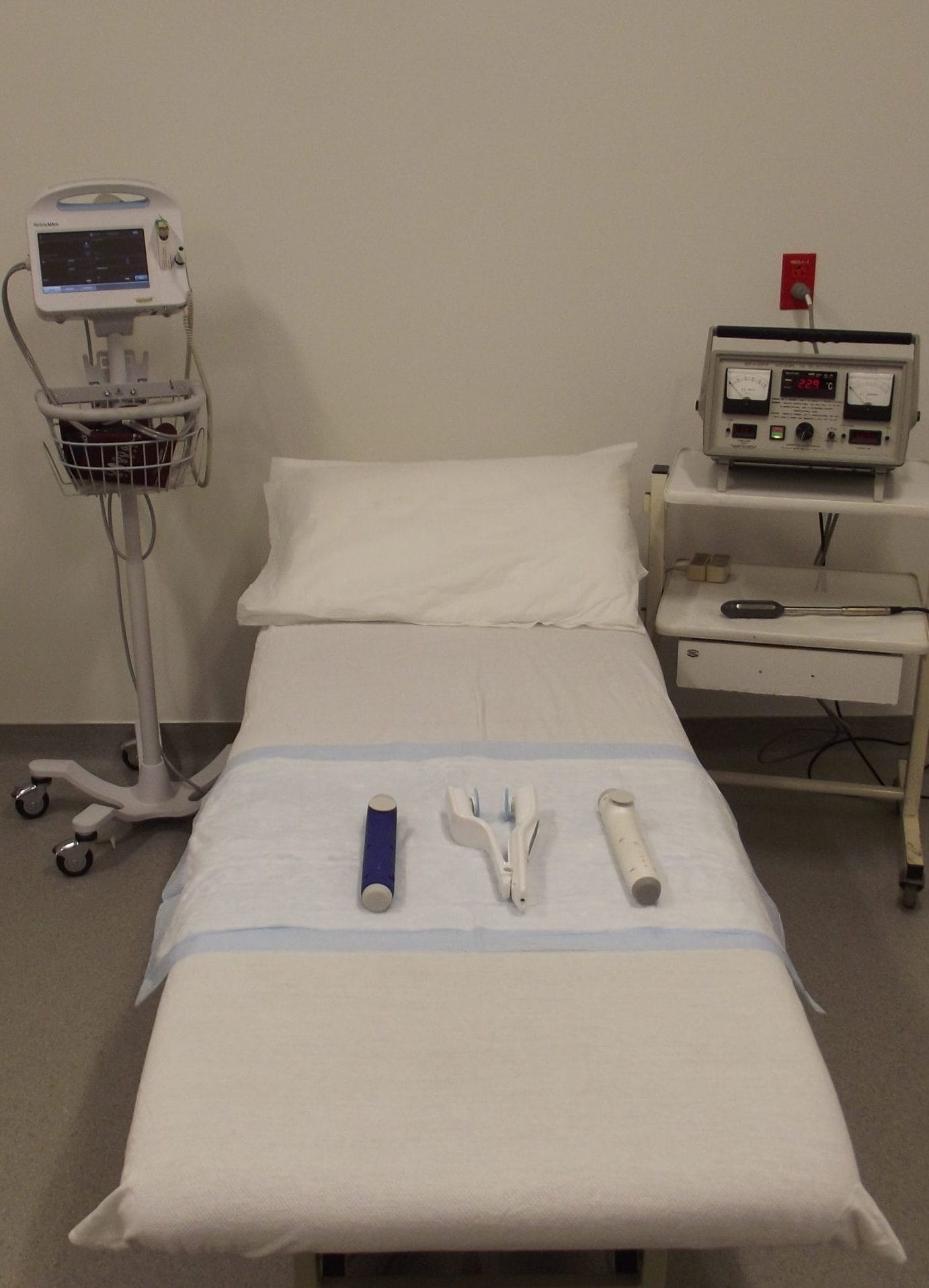
With these benefits in mind, Ibrahim and his colleagues pioneered research that explains why men with SCI experience poor sperm quality. And it’s this understanding of why men with SCI experience poor sperm quality that led them to Probenecid, an inexpensive oral medication used to treat gout, as a way to improve it. To understand why they decided to test Probenecid, let’s start at the beginning.
As mentioned, men with SCI have a similar number of sperm, but the sperm move less—a key factor in male infertility—than in men without SCI. To understand why the sperm of men with SCI are less motile, the researchers took a closer look at their semen.
What they found was that the semen of men with SCI has a lot of white blood cells called T-cells. T-cells produce cytotoxic chemicals called cytokines. In men with SCI, the researchers found very high levels of three particular cytotoxic cytokines: IL-6, IL-1 beta, and TNF alpha. “These are, in our opinion, what causes the damage to the sperm motility,” says Ibrahim.
“So, what’s wrong? What happens to cause this? We examined it a lot. And we found that these [cytotoxic] cytokines are the problem,” says Dr. Ibrahim.
Sperm coming out of testes in men with SCI tends to have good motility. It’s when sperm mixes with the fluid that forms semen once it leaves the testes that the sperm is damaged.
The next step in their research was to test what would happen to sperm motility if the cytotoxic cytokines in the seminal fluid could be neutralized. They performed a number of experiments using immunotherapies, such as monoclonal antibodies and receptor interference agents, to inhibit the cytokines. What they found was that when all three cytotoxic cytokines (IL-6, IL-1 beta, and TNF alpha) were neutralized, sperm motility improved.
“So, we said, ‘Okay, if that’s the case, then we have to try to find something that would manipulate the cytokines up the stream, before the sperm is mixed with the seminal fluid,’” says Ibrahim. “So, we worked with the neuroscientists in our institution and in the Miami Project to try to find a molecule that is causing these cytokines to be active. And we found a complex that is called inflammasome.”
Inflammasomes are large multi-protein complexes that assemble in the body in response to infection or stress. When activated, inflammasomes produce a chemical reaction that causes cytokines, including IL-1 beta and IL-18, to become active. This in turn leads to the release of the cytotoxic cytokines that damage sperm motility.
What triggers the activation of the inflammasome complex in men with SCI? According to Ibrahim, “It’s due to the inflammatory process that happens with the [spinal cord] injury. It’s a generalized inflammatory reaction in the body, and it’s concentrating in the glands that produce seminal fluid. So, there’s a lot of inflammation going around that causes all these cytokines and all these toxic elements to be in present. Nobody knows for sure, but that’s the most reasonable explanation to what we see.”
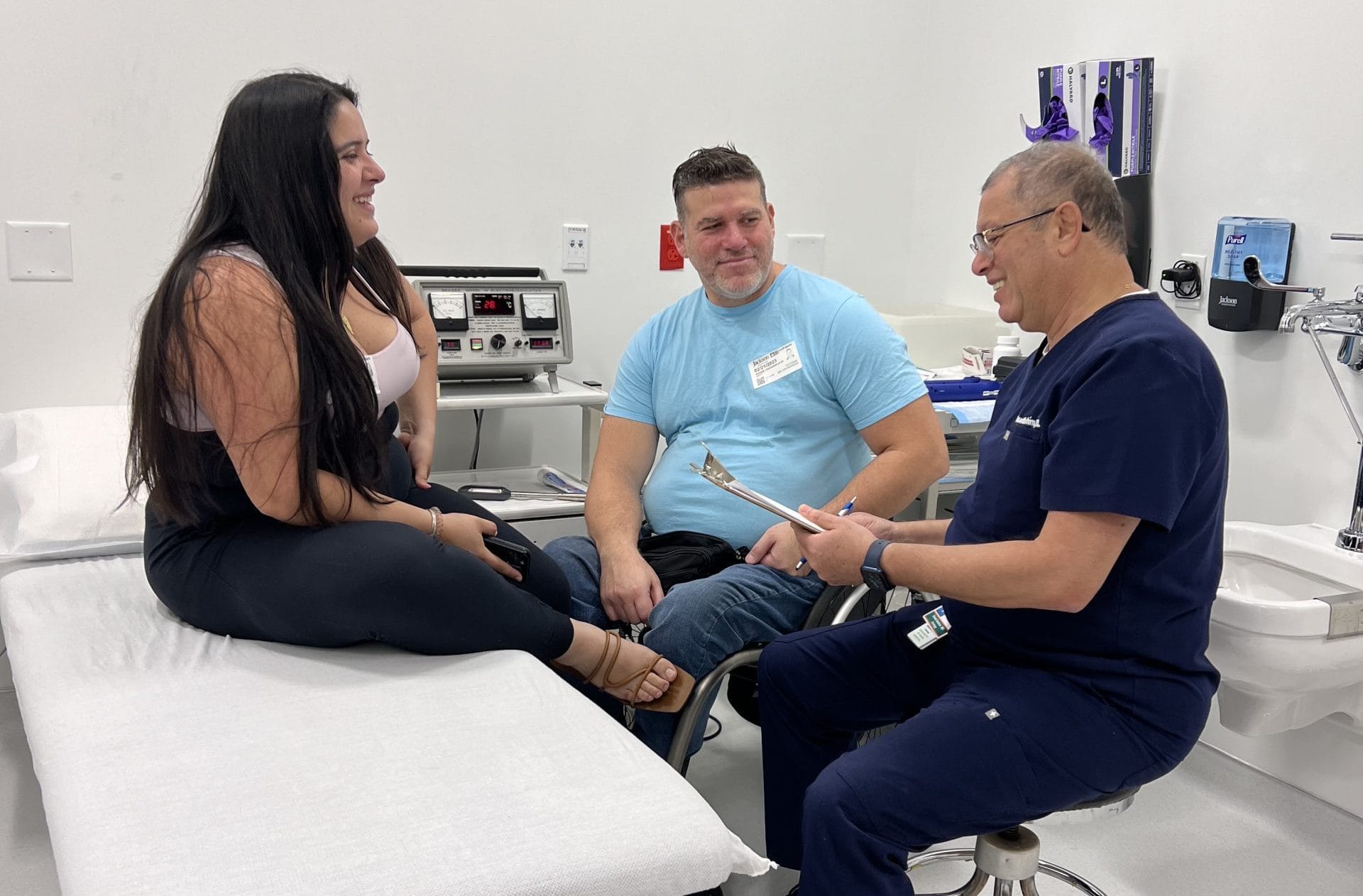
The next challenge that the researchers at the Miami Project faced was finding a drug, ideally one that’s already on the market, that would block the activation of the inflammasome complex and in turn minimize the effect of the cytokines that are damaging sperm motility downstream. That’s when they found Probenecid.
Probenecid, originally developed to treat gout, has been on the market for years. It’s taken by mouth, it’s cheap, and it has very few side effects. It also happens to block the activation of the inflammasome complex.
“So, we did a pilot study on 18 men with SCI,” explains Ibrahim. “We gave them Probenecid in a standard dose that is used for gout for four weeks. We took a semen sample from each patient before they started the Probenecid, when they completed the treatment, and then four weeks after as a follow-up. And we found that the motility improved in all the patients that we studied.”
The pilot study, published in the Journal of Spinal Cord Medicine, served as the impetus for the four-year grant funded by the US Department of Defense. The grant will fund a double-blinded, placebo-controlled randomized controlled trial comparing the effects of Probenecid in different doses on sperm quality among men with SCI—a first of its kind in male infertility research.
Our pilot study was the first ever to report oral medication that will improve [sperm] motility. And this is the first large double-blinded, placebo-controlled study for an oral medication.
–Dr. Emad Ibrahim
Participants in the trial will be randomly placed into one of three groups, and neither the participants nor the researchers will know who has been selected to each group. In one group, participants will take a full dose of Probenecid. In another group, participants will take a half dose. And in the third group, participants will take a placebo, or sugar pill. Participants in each group will take the pills for three months.
“The reason we’re doing the three arms (treatment groups) is first to see if participants taking the full dose or half dose benefit when compared to the placebo, and second to see if we can find the same effect of the medication at a half dose instead of a full dose. If we can get the same effect from a half dose, then we can minimize the side effects,” says Ibrahim.
Like in the pilot study, the researchers will take semen samples from participants before and after the treatment period. They’ll take another sample six months after the treatment ends. At each timepoint, they’ll examine indicators of sperm quality, including concentration and motility. They’ll also do a unique test to see if the DNA in the sperm is intact.
The Probenecid trial will get underway early in 2024, and Ibrahim expects results to be available in about three years’ time. The researchers are aiming to recruit about 90 participants for the trial, 30 per treatment arm. The trial is based in Miami, but the grant includes a budget to cover travel and accommodations for 10 participants from outside of the Miami area. “We are open for anyone [who meets the inclusion criteria] that is willing to participate and willing to make the travel [to Miami],” says Ibrahim.
To learn more about the study or find out if you’re eligible, go to clinicaltrials.gov and search “Spinal Cord Injury” (condition/disease), “Infertility” (other terms), and Probenecid (intervention/ treatment). You can also point your browser to themiamiproject.org for more information about the Male Fertility Research Program at The Miami Project to Cure Paralysis.
In the meantime, we’ll keep tabs on how the study progresses and report back when the results are in. While we wait, SCI BC and Vancouver Coastal Health’s Sexual Health Rehabilitation Service have an online resource where you can learn more about fertility, sexuality, relationships, parenting, and much more. Check it out at scisexualhealth.ca.
This article originally appeared in the Winter 2023 issue of The Spin. Read more stories from this issue, including:
- Adaptive gaming
- Peers’ evacuation experiences
- An exercise app for ambulatory peers
And more!
